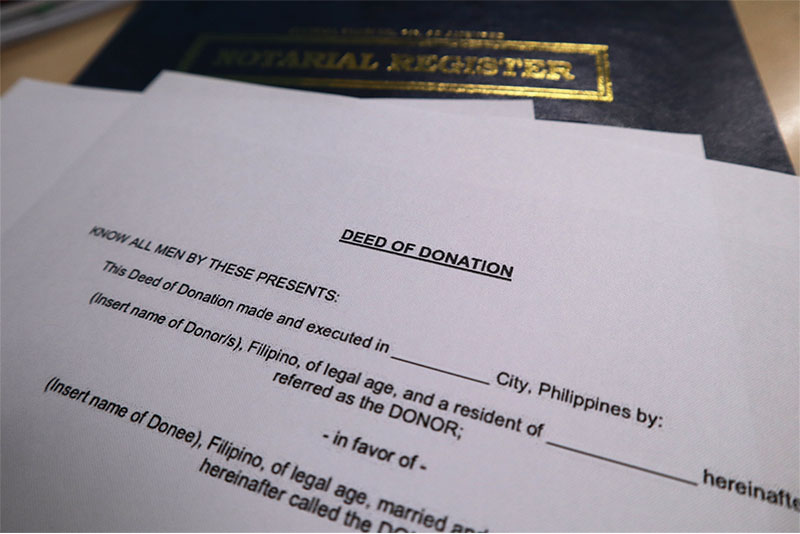Atty. Rodel C. Unciano discusses the recent BIR circular clarifying the imposition of donor's tax resulting from an heir's waiver or renunciation of his share from the specific property forming part of the estate of the decedent.

Donor’s tax on renunciation of inheritance
By Atty Rodel C. Unciano
"In taxation, liberality of a person is not at all free. The taxman is always under your watch irrespective of your liberality. Under the Tax Code, donor’s tax is levied, assessed, collected and paid upon the transfer by any person, resident or nonresident, of the property by gift. The tax shall apply whether the transfer is in trust or otherwise, whether the gift is direct or indirect, and whether the property is real or personal, tangible or intangible."
Under the Civil Code, donation is defined as an act of liberality whereby a person disposes gratuitously of a thing or right in favor of another, who accepts it. A gift or a donation, in order to be considered as one, should be made as an act of liberality or without any consideration or compensation being received in exchange therefor. A donation has been said to have the following essential elements: 1) the reduction of the patrimony of the donor; 2 the increase in the patrimony of the donee; and 3) the intent to do an act of liberality or animus donandi.
 In taxation, liberality of a person is not at all free. The taxman is always under your watch irrespective of your liberality. Under the Tax Code, donor’s tax is levied, assessed, collected and paid upon the transfer by any person, resident or nonresident, of the property by gift. The tax shall apply whether the transfer is in trust or otherwise, whether the gift is direct or indirect, and whether the property is real or personal, tangible or intangible. Donor’s tax is also imposed on the transfer of property, except real properties classified as capital assets, if the transfer is made for less than an adequate and full consideration in money or money’s worth.
In taxation, liberality of a person is not at all free. The taxman is always under your watch irrespective of your liberality. Under the Tax Code, donor’s tax is levied, assessed, collected and paid upon the transfer by any person, resident or nonresident, of the property by gift. The tax shall apply whether the transfer is in trust or otherwise, whether the gift is direct or indirect, and whether the property is real or personal, tangible or intangible. Donor’s tax is also imposed on the transfer of property, except real properties classified as capital assets, if the transfer is made for less than an adequate and full consideration in money or money’s worth.
Under Revenue Regulations (RR) 12-2018, renunciation by the surviving spouse of his/her share in the conjugal partnership or absolute community after the dissolution of the marriage in favor of the heirs of the deceased spouse or any other person/s is likewise subject to donor’s tax.
There’s a new item that the Bureau of Internal Revenue (BIR) is now considering as subject to donor’s tax. In Revenue Memorandum Circular (RMC) 94-2021, the BIR clarified that in case the heir waives or renounces his share from the specific property forming part of the estate of the decedent, donor’s tax shall likewise be imposed on the value forgone as a result of such waiver or renunciation.
According to the circular, general renunciation of an heir of his share from the inheritance is not subject to donor’s tax. This is consistent with Section 12 of RR 12-2018 which provides that the general renunciation by an heir, including the surviving spouse, of his/her share in the hereditary estate left by the decedent is not subject to donor’s tax, unless specifically and categorically done in favor of identified heir/s to the exclusion or disadvantage of the other co-heirs in the hereditary estate.
In the settlement of the estate of a deceased person, it is common for the heirs to agree among themselves for a specific property that each one of them will receive. This will result to a situation where an heir could be receiving a share lower or higher than the value of what should have been his rightful share in all the properties of the decedent, following the rules on succession under the Civil Code.
RMC 94-2021 clarified that in in this case, there is actually a partial renunciation of inheritance since the heir is waiving his share to only identified properties but not to the entire properties of the decedent. Hence, donor's tax shall be imposed on the value forgone as a result of such waiver/renunciation.
The author is a partner of Du-Baladad and Associates Law Offices (BDB Law), a member-firm of WTS Global.
The article is for general information only and is not intended, nor should be construed as a substitute for tax, legal or financial advice son any specific matter. Applicability of this article to any actual or particular tax or legal issue should be supported therefore by a professional study or advice. If you have any comments or questions concerning the article, you may e-mail the author at This email address is being protected from spambots. You need JavaScript enabled to view it. or call 8403-2001 local 140.



